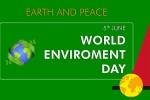MAIN EVENTS
|
05 June 2023
Iniziative (EN) -
Maison de la Paix (EN)
 The "World Environment Day 2023", established by the United Nations 50 years ago, on 5 June 1973, was held at the headquarters of the United States of the World and the Fondazione Mediterraneo.
The "World Environment Day 2023", established by the United Nations 50 years ago, on 5 June 1973, was held at the headquarters of the United States of the World and the Fondazione Mediterraneo.
"Eliminate plastic pollution" is the slogan-appeal with three watchwords: recycle, reuse and reduce.
The message is clear: the world is choking on plastic and action must be taken now.
"Every year humanity produces about 430 million tonnes of plastic," said Secretary General Prof. Michele Capasso in his message, "half of which is designed to be used only once. Of these, less than 10% are recycled and it is estimated that 19-23 million tonnes end up in lakes, rivers and seas each year, almost as much as the weight of 2,200 Eiffel Towers all together: if action is not taken soon, annual plastic production could triple by 2060".
Plastic is everywhere: in soil, seas, rivers, lakes, air, food. While it benefits humanity, its impact on every living thing and habitat is increasingly devastating. Each person seems to consume more than 50,000 plastic particles per year (many more if inhalation is taken into account) and the damage to species and human health is (almost) irreversible. Plastic pollution in nature - explains the WWF - has exceeded the "planetary boundary", beyond which there is no longer any guarantee that ecosystems will provide favourable conditions for life.
This pollution could be reduced by 80 per cent by 2040 if countries and companies made profound policy and market changes using existing technologies.
The United States of the World shared and confirmed the report's data pointing to solutions based on the 3 R: reuse (would allow for a 30% cut in pollution over the next 17 years); recycling (for an additional 20% less and up to 50% by eliminating fossil fuel subsidies and strengthening guidelines to improve recyclability); and repurposing (17% less by using alternative materials).
Two possible scenarios were modelled: the first, entitled "Too little, too late" reflects our current trajectory. According to this scheme, the questions to be urgently asked are: "What if societies continue at a similar pace, setting targets but not taking strong collective action? Will we cross irreversible points of no return, threatening the foundations of Earth's stable climate? Will driven inequality lead to worsening social tensions?"
The second scenario, titled "Giant Step", assumes that societies will embark on a new path towards a sustainable world by 2050. But the questions to be asked are: "What if we radically reconfigure our economies, energy and food systems so that they work for both people and the planet? Can we avoid the worst impacts of climate change and increase the resilience of our societies to shocks? Can we end extreme poverty, ensuring a healthy diet and access to quality education and healthcare for all?"
So: continue in the same direction as today or straighten the Planet's course? "There is no more time to lose," agree the scientists. Not least because this Earth "is the only one we have": that is why the United States of the World has chosen "EARTH AND PEACE" as its motto.
- MEDNEWS








